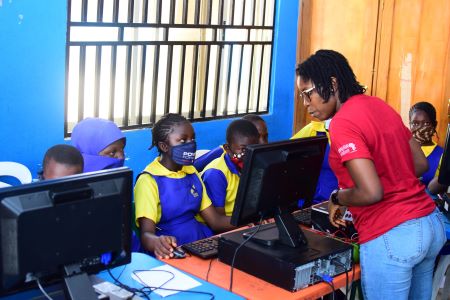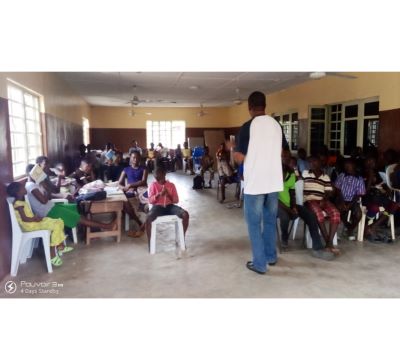Michael Dibie.
Millions of secondary school students from poor households and communities in Nigeria, especially girls, mostly from the Northern part of the country find it difficult to complete secondary education. On record, Nigeria has approximately over 10.5million out of school children.
Some of these children are potentially growing to become young adults someday and posing a serious security threat to the society and economic activities in the future if not checked.

According to experts, 55% of girls and 43% of boys from poor families do not complete secondary education. Also, there is education and learning inequality, with data showing that poor children get about 19.7% learning compared to 49.4% learning that children from middle and upper-income class get in Nigeria.
Without access to quality education, it is expected that millions of today’s teenagers with huge potentials and bright future will end up uneducated, unfulfilled, poorly skilled and unable to unlock their creative potentials.

Teacher taking pupils through session
In Abuja, Nigeria, Knosk N100 a day charity secondary school, admits children from poor and underserved households, and out of school children to give education to children from poor homes with some unfamiliar experiences due to inconsistent school attendance, lack of adequate learning support.
The school was founded in September 2019 by Kingsley and Irene Bangwell, just a few years Nigeria was declared the world’s poverty capital. The school admits children from nine years of age and provides them with access to quality secondary school education with the prospect of furthering and creating sustainable livelihood.
Co-founder, Irene Bangwell, said the school was set up with the intention of serving children from low-income families, adding that with the N100 (less than a dollar) a day, children get books, uniforms, free lunch and sanitary pads for girls every month.
“We have designed our model in such a way that whether we get a sponsor for a child or not, nothing destructs their education. So when children come in here on their first day of JSS 1, we guarantee that they get education for six years whether we get a sponsor or not or their parent pay school fee or not,” she added.

School founder with pupil
The school is maintained through a social financing model where individuals and families come together to cover the cost of fees for each child. At Knosk school, boys and girls are shaped through a transformative education that comprises: action learning, problem solving, vocational skills and leadership development.
“The full fee to keep the kids in school is N6000, so some of the parents provides that while the school identify co-sponsors that provides other things, so irrespective of the parents’ payment someone is ensuring the kids are kept in school,” Bangwell said.
The school has 38 staff strength of teaching and non-teaching staff, 107 students, 67 girls and 40 boys with the Mission to admit 60% of girls and 40% boys with the idea that in most poor homes in Nigeria, boys are given education more than the girl child. Hence every year during admission, girls are given preferential treatment in terms of admission.
“Nigerian’s biggest resource is human and education is one vehicle to pull out that potential for all to benefit, so my motivation for setting up the Knosk N100 a day school is to ignite children from poor homes and birth the potential that God has put inside of them so that it can benefit all,” Bangwell explained.
Edidiong Etuk, a teacher reiterates that at Knosk School they provide the students with action learning so it can build in them life skills to help them overcome poverty.
According to her such education empowering will enable the kids to be productive, innovative, creative and contribute towards the development of the community they find themselves. “The kind of education we give students here, is not just a general way of teaching, what we do here is more of action learning, these kids are from low-income families. So, we give them the training so that after leaving here, they can sponsor themselves.”
Most of the innovations according to the co-founder used in the school are home grown in order to keep the cost low. The school has co-sponsors that help in the day-to-day running of the school like paying salaries, paying rent, daily food for the kids. She said when they started in 2019, they had 30 students and only one student had a sponsor. Hence, the school survive through the assistance of other schools, individuals and organization so they can focus on ensuring that the learning is innovative and qualitative.
“There is a culture here that makes the kids stay in school, we have a strong support system, student even want to come to school on public holidays, so we intend to provide quality education that is supportive for kids from poor homes. We plan to open up in other communities within Abuja,” she said.
Franklin Ugwuoke, a 13-year-old boy from Enugu state in Junior secondary school (JJS) 2, said he and his brother joined the school from Junior secondary school (JSS 1). He says he wants to be an astronaut because he likes to explore.
“The school is a nice school and I think they should keep up so that students from low-income earners can afford to get quality education.
He says he is very happy with the kind of learning he gets from his teachers. “My parents are happy, at the end of every term, they always check my result to see that I perform well”.
Founder, Lela Blossom School, Abuja ,Abiola odunusi, said she commends the idea behind the school that sponsors children that are out of school or those that cannot afford school. She noted that her school has supported supported the Knosk school over the years and affirms it is an opportunity to be a blessing, and getting an opportunity to support the Nation.
According to her, Lela Blossom School support boys because they believe that boys need training and good education, adding that it is the only way they can help change the mind set of how the woman is treated in the society.
“It is a secondary school and giving children education is one of the great gifts you can give and education is not just about writing but an opportunity to socialize, broaden your mind, learn about the society and pick up values that will help you to become useful,” she explained.
The Management of Knosk over the next five years, plans to have at least two more schools in Abuja. Also, the school in the next ten years plans to have between five to ten more schools in Nigeria rural areas. Bangwell said they also intend to build a vocational center for some students who are not so good academically. And at same time set up a unique boarding model for young people that would shape their character and build their sense of responsibility.
The school currently occupies a rented building in Kuje area of Abuja and plans to complete and move to its permanent site. Knosk school became fully an accredited secondary school in Nigeria last year and as such students can write the West African Examination Council exam at the junior level within the school premises.




